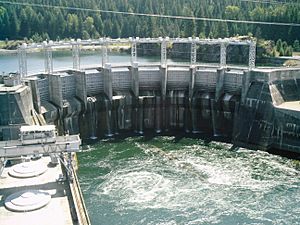Cabinet Gorge Dam facts for kids
Quick facts for kids Cabinet Gorge Dam |
|
|---|---|
 |
|
| Location | Bonner County, Idaho |
| Coordinates | 48°5′12″N 116°3′52″W / 48.08667°N 116.06444°W |
| Opening date | 1952 |
| Construction cost | $47 million |
| Operator(s) | Avista Corp. |
| Dam and spillways | |
| Impounds | Clark Fork River |
| Height | 208 ft (63 m) |
| Length | 600 ft (180 m) |
| Width (base) | 40 ft (12 m) |
| Reservoir | |
| Creates | Cabinet Gorge Reservoir |
| Catchment area | 22,000 sq mi (57,000 km2) |
| Surface area | 3,200 acres (1,300 hectares) |
| Power station | |
| Turbines | 4 turbines; 1 Kaplan, 1 mixed flow, 2 propellers |
| Installed capacity | 230 mw |
The Cabinet Gorge Dam is a large concrete dam in Idaho, a state in the United States. It sits on the Clark Fork River. This river flows through the Idaho Panhandle, which is the narrow northern part of Idaho. The dam is very close to the border with Montana.
The main job of the Cabinet Gorge Dam is to create electricity from the power of moving water. It is owned and operated by a power company called Avista.
Building the Dam
Work on the Cabinet Gorge Dam started in 1951. The company in charge of building it was the Morrison Knudsen Corporation.
Building a dam is a big job. First, the river's water had to be moved out of the way. Workers used two temporary dams, called coffer dams, to change the river's path. They had to work very fast because spring floods could have damaged these temporary dams.
To prepare the area for the dam, workers used 32 tons of dynamite. This helped to blast away 50,000 cubic yards of rock from the canyon walls. That's a lot of rock! The water was then sent through two long tunnels, each about 1,000 feet (300 meters) long. In total, about half a million cubic yards of earth were dug out from the site.
The dam was finished in 1952. The reservoir, which is the lake behind the dam, was filled in 1951. This was very quick, taking only half the time they expected!
What the Dam Does
The Cabinet Gorge Dam creates a large lake called the Cabinet Gorge Reservoir. This reservoir stretches into Montana.
The dam uses the power of the river's water to spin giant machines called turbines. These turbines then help to make electricity. This type of power is called hydroelectricity, and it's a clean way to produce energy.
 | Stephanie Wilson |
 | Charles Bolden |
 | Ronald McNair |
 | Frederick D. Gregory |

